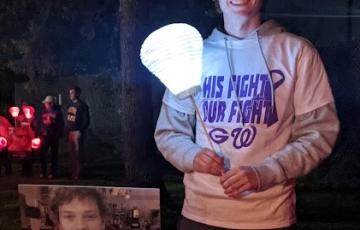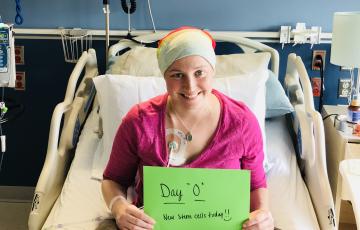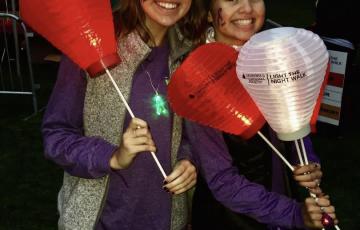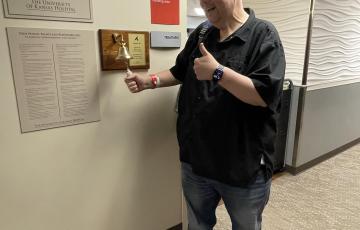Search Results
Be Your Child’s Advocate
Parents may need to educate other family members, friends, school personnel and healthcare providers about long-term and late effects. Here are some steps parents can take:
Options for Sperm Preservation
You may be able to take certain steps and precautions to preserve fertility before, during and after treatment.
Chemotherapy and Drug Therapy
The main treatment for active myeloma is systemic drug therapy (meaning the drugs travel through the bloodstream to kill malignant cells). The initial therapy, or “induction therapy,” for myeloma usually includes a combination of targeted agents and/or standard chemotherapy. This therapy is often followed by stem cell transplantation in eligible patients.
Common drugs combinations for people with newly diagnosed myeloma include:
Treatment Outcomes
With the current advances in treatment and supportive care, survival rates for myeloma patients have improved significantly in the last decades. It is not unusual for myeloma patients to live for 10 years or longer after diagnosis. Outcomes are influenced by a series of patient-specific factors, including disease stage, chromosome abnormalities, age and presence of other medical problems. Patients should discuss their own potential outcomes with their doctors.
Click here to access myeloma survival statistics.
Fundraise for LLS
Fundraise for LLS
Make an impact in the fight to cure cancer.
The Leukemia & Lymphoma Society® (LLS) is a global leader in the fight against cancer. LLS does more to advance science and support patients than any other cancer organization.
Join the fight against cancer by participating in one of our fundraising events: Light The Night, Team In Training, Big Climb, Visionaries of The Year, Student Visionaries of The Year, Ski, Scenic Shore, USA BMX, and more.
Talking About Cancer
Telling people about your diagnosis is a very personal decision. Some people with cancer choose to tell only close family. Others find it helps to let more people know about their diagnosis. Take some time to consider what and how much you would like to share about your diagnosis and how you want to share this information. By letting friends and family know about your diagnosis, you give them the chance to offer their support.
Here are some tips and things to keep in mind when telling someone about your diagnosis:

Jimmy
My journey with The Leukemia & Lymphoma Society (LLS) began in the summer of 2020. My 17-year-old, two-sport athlete son Jimmy came to me complaining that he had pulled a muscle in his neck lifting weights for football and baseball. However, after many doctors’ appointments and tests, on June 12, 2020, in the middle of a pandemic, I received a call that his biopsy was indeed cancer, stage 3 advanced Hodgkin lymphoma (HL). I now had to tell my 17-year-old son that his worst fear was now a reality.

Elisa
I was diagnosed with stage IV Hodgkin lymphoma (HL) in April 2022 at 27 years old. After months of debilitating symptoms and a week-long hospital stay, I finally had an answer as to what was going on with my body. I was relieved to have an answer, but "cancer" was the last thing I expected. Ironically, after my diagnosis and first chemotherapy infusion, I felt better than I had in months. I didn't feel like I had cancer; the only reminders were a few enlarged lymph nodes and the mediport protruding from the right side of my chest.

Rylie
My name is Rylie York, I am 20 years old and I'm currently a sophomore at Baylor University. I'm originally from Round Rock, Texas and I am a patient at Texas Children's Hospital in Houston, Texas. I was diagnosed with stage 4 Hodgkin’s lymphoma at 18 in the middle of my senior year of high school. I have relapsed twice since then and completed my bone marrow transplant this past August and September.

Paul & Lynn
In 2017, after 44 years of working in the railroad industry, Paul Sauter was just starting to enjoy his retirement, when his health started to decline out of nowhere. Typically, he was in extremely good shape and enjoyed long hikes with his wife, Lynn. One day, while on a mountain climb trip in Arizona, Lynn was concerned when she noticed Paul was not his usual athletic self. When he was unable to get out of bed because of severe back pain, she knew something wasn’t right.

Will
I am a cancer mom. I WAS a cancer mom. My youngest son, Will, was diagnosed with Hodgkin lymphoma (HL) at age 19 in April of 2019. He, his dad, and I were beyond shocked when we heard the news that the swollen lymph nodes that came up out of the blue one March morning were indeed HL. We didn't really know anybody personally that had it. We didn't know what exactly all the words meant at that moment in time, but we knew it wasn't what we had planned for our youngest son.

Amy
I am a stage IV non-Hodgkin lymphoma survivor (NHL). The diagnosis came as a complete shock since I was a relatively healthy, active young adult working and enjoying life with family and friends. With a family history of breast cancer, I was advised to start having screening mammograms in my 20s. After a few clear screenings, I approached my 2018 screening and annual health visit to my primary care doctor's office with optimism. Within 48 hours, I received the dreaded call many women fear ― abnormal results.

AJ
On December 23, 2018, our lives changed forever. And sadly, it was just the beginning.
I was assigned to work a night shift an hour away from where I dropped my son, AJ, off at my sister’s. I got a call from her two hours later. She said AJ was not feeling or looking well. My sister, Kyesha, took him to the emergency room.
I rushed out, put my emergency lights on, and drove an hour to the hospital. When I got there and saw my son, I didn’t know what to think or say. Tears started rolling down my face. AJ looked almost dead; his color was so blue.
Infections
Cancer patients, especially those undergoing chemotherapy, are more likely to get infections because of their weakened immune systems. Cancer and certain cancer therapies can damage the immune system by reducing the number of infection-fighting white blood cells. Patients with a low white blood cell count are at a higher risk of developing infections, and these infections can be more serious and harder to treat. In severe cases, infections can lead to death.
Pain
A cancer diagnosis does not mean that you will have pain. Still, many people with cancer do have pain at some point. Good pain control is part of proper cancer care.
Managing pain may result in better treatment outcomes, so patients should talk to their healthcare team about their pain right away. Left untreated, pain can:
Dating, Sexuality & Intimacy
As a young adult you may be dating, in a relationship, or married. Cancer can make navigating romantic relationships complicated.
DatingDating can be intimidating no matter your situation. Remember, every date before your diagnosis probably did not go perfectly. You may have bad dates after your diagnosis as well. You may also meet incredible, new people.
Treatment
Polycythemia Vera (PV) is a chronic disease: It's not curable, but it can usually be managed effectively for very long periods. The goal of therapy is to reduce the risk of thrombosis and to ease symptoms by lowering the number of extra blood cells.
Many treatment options are designed to manage PV by lowering hematocrit levels below 45 percent for men and 42 percent for women. Careful medical supervision and therapy is important to keep the hematocrit concentration at normal levels.
Sara
Seeing Roses

Joshua
Just three days after Christmas, my world was turned upside down. I was admitted to the hospital because I was unable to keep any food down and felt terrible overall. Upon admission, I had a multitude of issues, just a few being extremely high uric acid levels, severe dehydration, pancreatitis, and nephrosis. They also discovered that I had lost 20 lbs.! Later in the hospital, I would lose 20 more.

Jane
In October 2015, I was diagnosed with Hodgkin lymphoma (HL). After growing up never getting sick, I had cancer. It was incredibly difficult to comprehend at the age of 13 that I was about to endure something most people won’t experience in a lifetime. I went through four rounds of chemotherapy and was in remission in January of 2016. Once you’re in remission, you believe that that’s the end. You’ll have a few check-ups here and there, but in your head, you envision no more cancer.

Thomas
I had bariatric surgery on May 11, 2022. At the time, I weighed just under 600 pounds, and I understood that there was a higher possibility for complications. My three-hour procedure turned into a six-hour procedure, and my overnight stay in the hospital turned into a week. During surgery, they discovered my spleen was significantly larger than normal, and in the days following my surgery, I kept losing blood. After two exploratory surgeries, four units of blood, and a trip to the ICU later, I was finally released from the hospital with no confirmed cause of bleeding.
Erin & Meghan
I always loved fall. It is such a special time. My birthday is the first day of fall. I love unpacking my favorite boots, lighting pumpkin spice candles, and making warm soups. Fall always signified that special holidays and quality time with family were quickly approaching. These were events to get excited about! But in the last few years, fall has taken on a new meaning for me.

Chaneta Juliet
Hi, my name is Chaneta, I like to go by Juliet. This past year has been an interesting one, to say the least. I’m a singer-songwriter who wrote and released an album in October 2017. I thought the year was going to be an amazing one–promoting and performing–unfortunately, I performed one time and I began to literally unravel. In December 2017, I caught the flu. Normal stuff, not too bad right? Well, about three weeks in, it got worse. It turned into walking pneumonia. Chest X-rays revealed a blood clot lodged in my right-side lung.

Tricia
My story is truly about the little family that could. In 2002, I felt I had it all: a loving partner, a new job offer, and plans to start a family. Upon my return from a business trip in May, that feeling shifted as a large lump appeared on the side of my neck. Several doctor visits, tests, and sleepless nights later, I received a phone call on the way to a meeting from a doctor. He asked me to pull the car over. He told me I had cancer. Everything stopped.
Joshua
Just three days after Christmas, my world was turned upside down. I was admitted to the hospital because I was unable to keep any food down and felt terrible overall. Upon admission, I had a multitude of issues, just a few being extremely high uric acid levels, severe dehydration, pancreatitis, and nephrosis. They also discovered that I had lost 20 lbs.! Later in the hospital, I would lose 20 more. I remained in excruciating pain for three weeks while multiple branches of the hospital were trying to find out what was wrong with me.